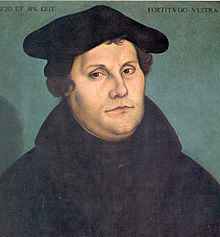Martin Luther is referred to as the Reformer and the inspiration of the Protestant Church from what then was the Roman Catholic Church. He opposed superstitious teachings and payment of indulgences, which were paid to the Church and priest as an exchange for pardon of individual’s and their families from purgatory. Luther, although a German monk, assailed the Church for its apostasy. Luther argued that grace, faith, and repentance were the only means of salvation, a faith that unmediated by the church. Luther believed that the Bible was the only infallible authority in respects to Christianity and that divine revelation was the only means in which it could be learned. He asserted that the baptized Christian was its priesthood, challenging the authority of the Pope of the Roman Catholic Church. He was eventually severed from the monastery, for which followed a period of isolation, where he wrote the first German translated Bible. It was at an assembly, for which he was called upon to recant 41 assertions he’d made regarding the Church and the Pope that Luther spoke these words after asking that he might have time to answer in regards to his willingness to recant, he said: “Unless I am convinced by the testimony of the Scripture or by clear reason (for I do not trust either in the pope or in councils alone, since it is well known that they have often erred and contradicted themselves), I am bound by the Scriptures I have quoted, and my conscience is captive to the Word of God. I cannot and will not retract anything, since it is neither safe nor right to go against conscience. I cannot do otherwise, here I stand, may God help me, Amen.’ Days later, the Emperor declared Luther an outlaw and sought after his arrest. Consequently, Luther on his return from the assembly was secretly intercepted by Frederick III, the prince of Saxony for which he spent a time of isolation at the castle of Wartburg. During the period of isolation, a peasant war broke out over the whole of Germany, killing about 100,000 people primarily motivated by rebels who used distorted interpretation of Luther’s works to provoke the people. Still, controversy arose again regarding statements made by Luther in respects to the Jews, statements that were distorted and used as propaganda by the Nazis in 1933-1945.
Martin Luther


